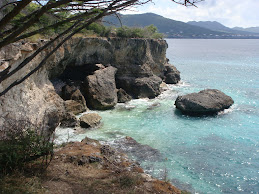Lionel Robbins’ famous definition of economics states that “Economics is the science which studies human behavior as a relationship between given ends and scarce means which have alternative uses.”… People make decisions about how to allocate resources efficiently, in order to satisfy basic needs and as many additional wants as possible.
Today this definition can still apply, but many of the wants and needs of the public have changed dramatically. In Curaçao, the recent COVID-19 crisis is having a long-lasting impact on society and the economy. An article recently published in a local newspaper sheds some light on the vulnerabilities for the people of Curaçao. Due to road restrictions, curfews and commercial closures, the public must deal with unemployment, housing costs, utility costs and food on their own and with little help from the government. Local groups such as Corona Hulp Curaçao and foundations such as Stichting Samen Doen and Stichting Hulp are operating and are accepting donations for food and household items to reach more families. But with government restrictions in place indefinitely, they are limited in their outreach.
With a lack of employment on a large-scale, societal needs have drastically changed. An important UN Sustainable Development Goal for Curaçao is poverty reduction (SDG 1) and to “leave no one behind". In a time of crisis, vulnerable groups such as women, children and undocumented immigrants are particularly effected due to factors such as insufficient income, debt, discrimination and inadequate housing and transportation. People today are in the most need of food, shelter, electricity (SDG 7) and clean water (SDG 6) and without a basic income, people in their daily lives are living in fear of further loss and devastation. Vulnerable groups are the most at risk of losing these basic necessities and this will increase overall poverty as well as inequality.
According to the World Bank, social protection programs are often the first line of defence to protect the poor and vulnerable in a fragile or conflict-affected situation. They are designed to be adaptable so that support can be quickly scaled up during difficult times. This approach protects a country’s human capital investments (i.e. education and healthcare) by building resilience and providing access to income earning opportunities so that vulnerable people don’t fall deeper into poverty. Partnerships are key to providing effective social protection programs and can be built between government, local organizations, businesses and residents in order to reach and protect more people.
Urgent recovery measures are necessary in order to minimize long-term impacts, particularly for vulnerable and marginalized groups, and to help society to recover better. During the existing crisis an important economic priority should be to ensure that the work force remains employed even if quarantined or forced to stay home. Furthermore, governments should channel financial support to public and private institutions, such as schools, electricity and water utilities and medical services, that vulnerable groups depend on. Finance should be disproportionally directed to parties with a socially, economically and environmentally sustainable profile, or at least those that commit to transmit towards such a profile in the medium-term. For example, an increase in availability of affordable renewable energy technology combined with relevant infrastructure to support their use at a large scale could dramatically reduce the cost of living for local citizens and also reduce green house gas emissions. Such policies, if implemented efficiently, could be imperceptible in the daily lives of most people and businesses.
The health and well-being of our society can be further enhanced through a circular economy that is anchored in nature-based solutions and geared towards public well-being. Economic change is necessary and can be facilitated by following the UN Agenda 2030 (17 SDGs) and A Roadmap for SDG implementation in Curaçao which highlights the need for strengthening the institutional framework and adapting laws, as well as improving urban infrastructure to address poverty. Furthermore, the European Green Deal by the European Commission promotes the efficient use of resources by moving to a green and circular economy. A circular economy has the potential to create many jobs while preserving precious and increasingly scarce resources, reducing environmental impacts of resource use and adding new value locally to waste products.
A decisive march along a sustainable pathway will enhance economic and environmental resilience, create jobs, and improve health and well-being in both rural and urban communities. In times of crisis, existing ideologies are challenged and this can pave the way for a more inclusive society. In downturns, as Charles Darwin surmised, those who survive “are not the strongest or the most intelligent, but the most adaptable to change.”
References:

